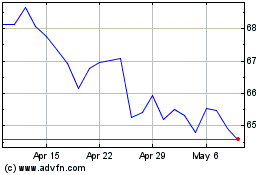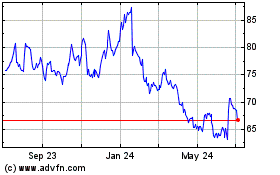Judge Sides With Gilead Against Merck in Hepatitis C Case
June 07 2016 - 5:00PM
Dow Jones News
A federal judge has reversed a jury's verdict that Gilead
Sciences Inc. should pay $200 million to Merck & Co. in a
drug-patent dispute, after the judge concluded Merck engaged in
misconduct in its efforts to obtain patents for hepatitis C
drugs.
U.S. District Judge Beth Labson Freeman castigated Merck in a
65-page order filed in federal court in San Jose, Calif., on
Monday, concluding a former Merck in-house patent attorney involved
in obtaining patents for hepatitis C drugs was "dishonest and
duplicitous" and thus "crossing the line to egregious
misconduct."
"Merck is guilty of unclean hands and forfeits its right to
prosecute this action against Gilead," the judge wrote.
The ruling overturns the March decision by a federal jury
ordering Gilead to pay Merck $200 million, after finding that two
U.S. patents held by Merck and its partner, Ionis Pharmaceuticals
Inc., were valid and infringed by Gilead's multibillion-dollar
hepatitis C drugs, Sovaldi and Harvoni. The trial arose from
Gilead's 2013 lawsuit seeking a judgment that the Merck patents
were invalid.
The Merck-Ionis patents cover a range of compounds treating
hepatitis C. Merck recently began selling its own hepatitis C drug,
Zepatier. Gilead recorded $19.1 billion in combined 2015 sales for
Harvoni and Sovaldi.
After the jury verdict and award in March, Judge Freeman
presided over a bench trial in which Gilead argued it shouldn't
have to pay Merck because Merck was dishonest in obtaining its
patents.
Gilead said that in 2004, then-Merck patent attorney Philippe
Durette had a conference call with employees of Pharmasset Inc., in
which he learned the chemical structure of an experimental
hepatitis C drug that Pharmasset was developing, code-named
PSI-6130. Gilead later spent more than $11 billion to acquire
Pharmasset and its hepatitis C drugs.
Gilead said Mr. Durette misused what he learned on the call to
subsequently change claims in pending Merck patent applications in
a way that would cover Pharmasset's technology.
Judge Freeman largely sided with Gilead in her ruling on Monday,
finding that Mr. Durette lied to Pharmasset by saying he wasn't
involved in Merck's internal hepatitis C research, and that he
subsequently lied about the 2004 conference call in a deposition
and court testimony in the patent lawsuit.
Mr. Durette couldn't be reached for comment. A call made to a
phone number listed for him wasn't answered.
A Merck spokeswoman said Mr. Durette no longer works for the
company. She said the judge's ruling "does not reflect the facts of
the case," and it plans to appeal. She said the jury recognized
that patent protections are essential to the development of new
medical treatments.
A Gilead spokeswoman said the company was pleased with the
ruling. "Gilead has always believed Merck's patents are invalid and
unenforceable, and we feel vindicated by today's decision," she
said.
Write to Peter Loftus at peter.loftus@wsj.com
(END) Dow Jones Newswires
June 07, 2016 16:45 ET (20:45 GMT)
Copyright (c) 2016 Dow Jones & Company, Inc.
Gilead Sciences (NASDAQ:GILD)
Historical Stock Chart
From Mar 2024 to Apr 2024

Gilead Sciences (NASDAQ:GILD)
Historical Stock Chart
From Apr 2023 to Apr 2024
